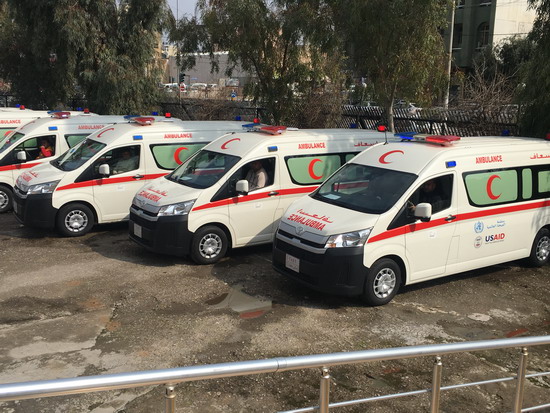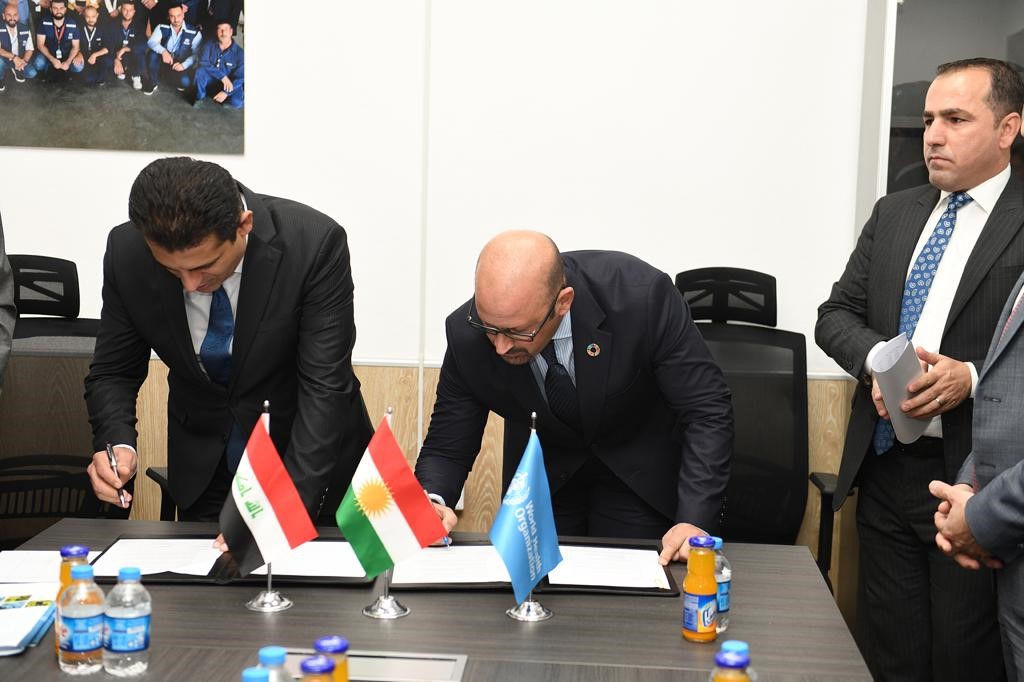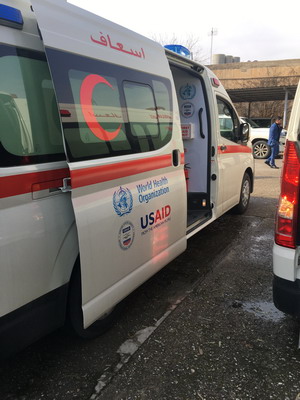 The new fully equipped ambulances were delivered to the Ministry of Health to strengthen ambulatory services and referral pathways for IDPs and host community
The new fully equipped ambulances were delivered to the Ministry of Health to strengthen ambulatory services and referral pathways for IDPs and host community
Erbil, 17 February 2020 – The World Health Organization (WHO) today handed over a new batch of fully equipped ambulances to the Ministry of Health in Kurdistan Region of Iraq to support the needs of internally displaced persons (IDP) and the host community.
This second batch of 8 ambulances is part of a consignment of 20 fully equipped ambulances procured in 2019 with funds from the US Office for Foreign Disaster Assistance (OFDA) to be distributed to the directorates of health in Ninewa, Duhok, Kirkuk, Sala Alddin, Anbar, Erbil, Baghdad and Sulymania.
Earlier in June 2019, the first batch of 10 ambulances was distributed to provide uninterrupted referral services in 4 governorates of Sala Alddin, Duhok, Erbil and Ninewa.
“The recent conflict in Iraq has impacted the health system and resulted in the destruction of, and damage to, hundreds of ambulances,” said Dr Adham Rashad Ismail Abdel Moneim, WHO Representative and Head of Mission in Iraq.
 WHO Representative in Iraq Dr Adham Abdel Moneim (left) hands over ambulance keys to Minister of Health of the Kurdistan region Dr Saman Barzanji on 17 February 2020“WHO and the local health authorities have identified the problem and proceeded with the deployment of a network of new ambulances equipped with basic, as well as advanced medical technology to support service delivery in areas housing IDPs and returnees in the Kurdistan region and rest of Iraq. The new donated ambulances will surely save more lives and strengthen the provision of referral and ambulatory services in the country,” Dr Abdel Moneim added.
WHO Representative in Iraq Dr Adham Abdel Moneim (left) hands over ambulance keys to Minister of Health of the Kurdistan region Dr Saman Barzanji on 17 February 2020“WHO and the local health authorities have identified the problem and proceeded with the deployment of a network of new ambulances equipped with basic, as well as advanced medical technology to support service delivery in areas housing IDPs and returnees in the Kurdistan region and rest of Iraq. The new donated ambulances will surely save more lives and strengthen the provision of referral and ambulatory services in the country,” Dr Abdel Moneim added.
The IDPs and returnees resettling back in under-recovery areas under recovery face difficulties in accessing referral services, including the disruption in the referral pathway, using privately rented vehicles without any medical assistance, the long delays at security checkpoints and out-of-pocket expenses.
 To date, WHO has donated a network of ambulances to support directorates of health in Ninewa, Duhok, Kirkuk, Sala Alddin, Anbar, Erbil, Baghdad and Sulymania to transport both emergency and trauma patients to health facilities.
To date, WHO has donated a network of ambulances to support directorates of health in Ninewa, Duhok, Kirkuk, Sala Alddin, Anbar, Erbil, Baghdad and Sulymania to transport both emergency and trauma patients to health facilities.
The procurement of the latest shipment of ambulances was made possible with the generous funding from the US Office for Foreign Disaster Assistance (OFDA). An average of 1200 to 1500 patients a month are expected to benefit from this service in each targeted location.
However, WHO would like to express its gratitude to the generous contributions from OFDA and the European Commission Civil Protection and Humanitarian Aid (ECHO) for their continuous support in availing primary and secondary health care for IDPs, returnees and the host community in Iraq.
Related links
New USAID/OFDA contribution boosts comprehensive health services in Iraq
18 November 2019
WHO delivers ambulances to support medical services in hard-to-reach areas
12 June 2019
For more information:
Ms Ajyal Sultany
WHO Communications Officer
+964 7740 892 878
Ms Pauline Ajello
WHO Communications Officer
+964 7729 877 288








